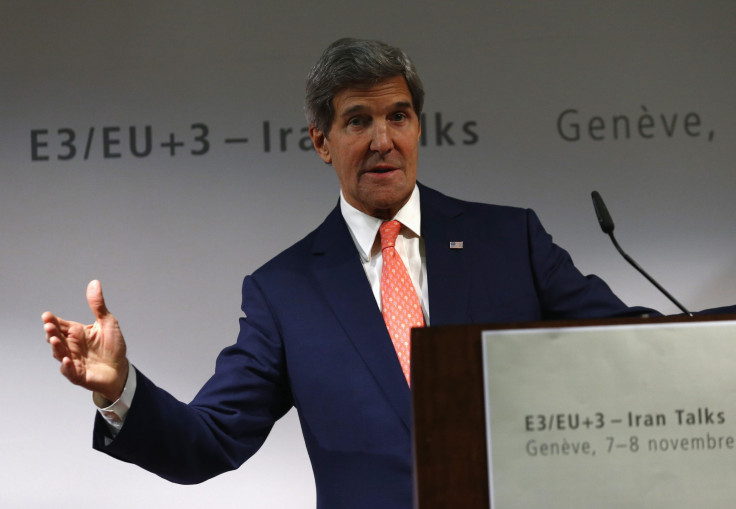Iran Nuclear Talks: 5 Takeaways From Today’s Negotiations In Geneva

On Saturday, diplomats from seven countries, including the U.S. and Iran, met in Geneva for another round of negotiations over Iran’s nuclear program. Representatives from the U.S., including Secretary of State John Kerry, Britain, France, Germany, Russia, China, and Iran came together to try and hammer out a deal over Iran’s developing nuclear energy.
Negotiators from the UK, Germany, France, China and Russia have been meeting with Iranian diplomats since Wednesday. The discussions are focused on delaying Iran’s nuclear program for another six months, including stopping construction on a reactor that could produce bomb material, until a more comprehensive agreement can be reached, Reuters reports.
"We're not here because things are necessarily finished," Britain's Foreign Secretary William Hague told reporters, according to USA Today. "We're here because they're difficult, and they remain difficult."
Iran’s Deputy Foreign Minister Abbas Araqchi said, according to ISNA news agency: "We hope to reach a result tonight but if we don't ... it is possible that the talks will continue tomorrow as well. The discussion is over wording, and progress has not been bad.”
Tensions with Iran have risen after a decade of failed negotiations. Even the latest round of talks, which took place earlier this month, ended in a stalemate.
The stakes of nuclear talks with Iran are high. Iran is feeling the weight of crippling international sanctions against the country, and the possibility of Isreali and even U.S. military action looms large should the negotiations turn sour.
Iran signed the Non-Proliferation Treaty, an international treaty that dictates the right of countries to develop civilian nuclear technology in exchange for not developing nuclear weapons, in 1968, the year the treaty was made. Leaders from Tehran, who have previously shirked inspections and investigations by U.N. agents of the country’s nuclear program, insist the program is for civilian use.
From the current negotiations, Iran hopes to get foreign powers to ease sanctions against Tehran. Here are five takeaways from the Iran nuclear negotiations in Geneva:
Iran and foreign leaders have agreed to a majority of the draft of the agreement. There’s just some fine-tuning left. “We have agreed to 98 percent of the draft ... but the remaining 2 percent is very important to us,” Iranian Deputy Foreign Minister Abbas Araghchi told reporters.
British Foreign Secretary William Hague said the agreement was a battle of words. According to Reuters, there are two to three key issues that remain.
Iran won't strike a deal that doesn’t include some leeway for uranium enrichment. Iran maintains that its nuclear program has peaceful intentions, mainly for energy, medical and research. But the technology they are employing could also be used to successfully create nuclear warheads.
One of the key issues in nuclear talks with Iran is the construction of the Arak heavy-water reactor that could produce plutonium. Plutonium, foreign leaders warn, could be used to create atomic bombs. As a participant in the Non-Proliferation Treaty, Iran has always maintained its "right to enrich" uranium, but Western powers disagree.
The U.S. and its allies have said they’re ready to alleviate some of the sanctions imposed on Iran. Tehran has clearly stated that it wants the U.S. to dismantle sanctions it has on Iran’s oil exports.
Israel said the deal being offered to Iran would only give Tehran more time to develop its nuclear program.
Israel Prime Minister Benjamin Netanyahu called the agreement an "unbelievable Christmas present,” saying that it allowed Iran to continue expanding its nuclear program for “practically no concessions at all.”
© Copyright IBTimes 2024. All rights reserved.





















